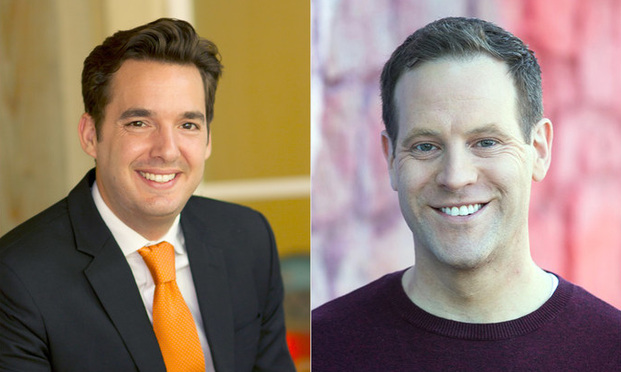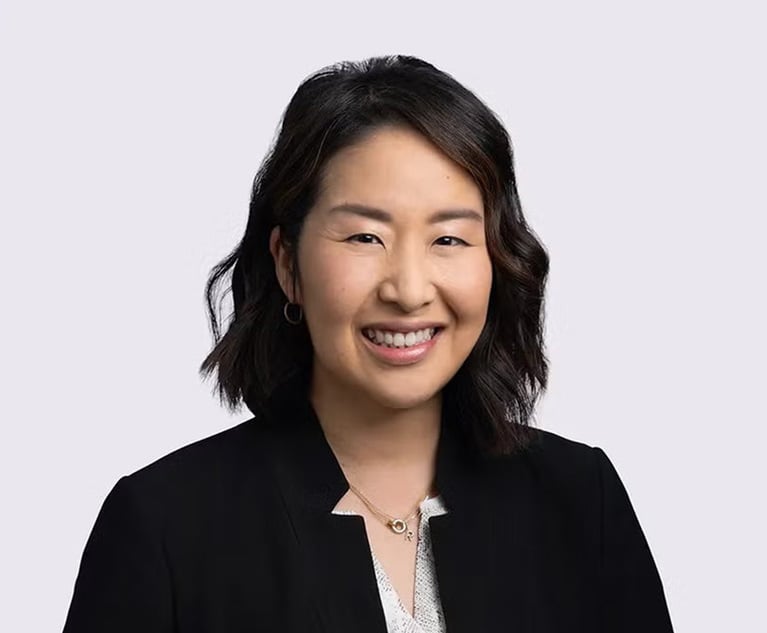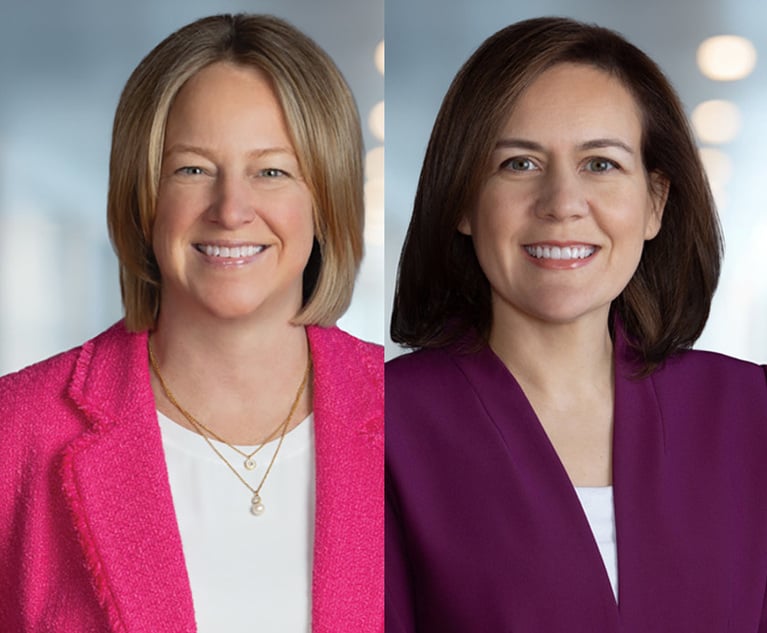New Georgia Legal Incubator Will Be A 'Law Firm Ride-Along'
The organizers, Matt Wetherington and Kurt Kastorf, say the Georgia Legal Accelerator will offer firsthand experience and advice for those starting their own law practice.
September 26, 2019 at 03:57 PM
4 minute read
 Matt Wetherington (left) and Kurt Kastorf (Courtesy photos)
Matt Wetherington (left) and Kurt Kastorf (Courtesy photos)
Trial lawyers Matt Wetherington and Kurt Kastorf are starting an incubator program for lawyers who either want to start their own firms or become shareholders in one, which they say will be unique in offering firsthand experience and advice.
"There's a difference between telling attorneys how to run a business and sharing how I'm running a business—the decisions I've made and how much they cost," said Wetherington, who just opened his own plaintiffs firm in August. "This is a law firm ride-along."
Wetherington, 34, spent five years learning the ropes from his former law partner, Mike Werner, before starting his firm, which already employs two associates and three staff.
The one-year incubator program, which the two organizers have dubbed the Georgia Legal Accelerator, will be a mix of small group meetings, CLE-style presentations on aspects of running a law firm and one-to-one mentoring. There is no cost to participate.
While the two are not getting paid to run the new incubator program, they believe it will give them a big payoff. Kastorf said it will be well worth the time if he develops a few new relationships and fosters good mentoring.
"I expect I'm going to learn much more from these people as they grow their careers than I have to give them," Wetherington said. "The next big idea is going to come from this group, and I get to be part of that success story."
The two envision a group of 15 to 25 lawyers, and the deadline to apply is Oct. 1. A short online application is available at www.wfirm.com/gla.
Kastorf, 39, emphasized that the program will be a collaborative effort between themselves and the other participants. He has been a partner for two years at The Summerville Firm, a five-lawyer litigation boutique, after a decade in Washington, D.C., working for the Department of Justice and then Wilmer Cutler Pickering Hale and Dorr.
"One of the things that impressed me most about leaving a massive firm and now working with attorneys who are primarily in small firms is how they band together and share resources," Kastorf said, explaining that the Summerville Firm frequently co-counsels with other firms to take on complex cases.
"That is something I think we can bring to our legal community. There is more sharing we can be doing," he said. "The very successful trial attorneys are not just great attorneys—they've gotten very good at identifying a network and working with other firms."
The Georgia Legal Accelerator is for lawyers with any type of practice—not just trial lawyers. "The basics of negotiating or having a happy and productive staff don't change from practice to practice," Wetherington said.
'Make or Break Decisions'
Kastorf said the two checked out numerous state bar programs that advise lawyers on how to start a law firm and run a legal practice before concluding there was an unmet need for a legal incubator program that offers firsthand experience from practitioners who are still figuring it out themselves.
"I just spent $5,000 on a marketing opportunity that failed miserably—and I've also done things that cost little or no money that have done great," Wetherington said. "I think what's missing from these programs is that firsthand experience."
"I'm in the middle of making what most firms consider make or break decisions every day. Now is the perfect time to document and share that information," he added.
For instance, just one month into running his own shop, Wetherington has already tried out eight time-tracking software programs. "I'm testing them all, so I will know which one to pick," he explained.
After participating in the one-year program, Wetherington and Kastorf hope, the 2020 class for the Georgia Legal Accelerator will become mentors and advisers to the next group.
"The Georgia bar has a long tradition of collegiality, but things have become more fragmented. We want to bring that back," Wetherington said.
This content has been archived. It is available through our partners, LexisNexis® and Bloomberg Law.
To view this content, please continue to their sites.
Not a Lexis Subscriber?
Subscribe Now
Not a Bloomberg Law Subscriber?
Subscribe Now
NOT FOR REPRINT
© 2025 ALM Global, LLC, All Rights Reserved. Request academic re-use from www.copyright.com. All other uses, submit a request to [email protected]. For more information visit Asset & Logo Licensing.
You Might Like
View All
12-Partner Team 'Surprises' Atlanta Firm’s Leaders With Exit to Launch New Reed Smith Office
4 minute read
After Breakaway From FisherBroyles, Pierson Ferdinand Bills $75M in First Year
5 minute read
On the Move: Freeman Mathis & Gary Adds Florida Partners, Employment Pro Joins Jackson Lewis
6 minute read
Veteran Litigators Move From Sidley Austin to Alston & Bird's New Chicago Office
3 minute readTrending Stories
- 1Reviewing Judge Merchan's Unconditional Discharge
- 2With New Civil Jury Selection Rule, Litigants Should Carefully Weigh Waiver Risks
- 3Young Lawyers Become Old(er) Lawyers
- 4Caught In the In Between: A Legal Roadmap for the Sandwich Generation
- 5Top 10 Developments, Lessons, and Reminders of 2024
Who Got The Work
J. Brugh Lower of Gibbons has entered an appearance for industrial equipment supplier Devco Corporation in a pending trademark infringement lawsuit. The suit, accusing the defendant of selling knock-off Graco products, was filed Dec. 18 in New Jersey District Court by Rivkin Radler on behalf of Graco Inc. and Graco Minnesota. The case, assigned to U.S. District Judge Zahid N. Quraishi, is 3:24-cv-11294, Graco Inc. et al v. Devco Corporation.
Who Got The Work
Rebecca Maller-Stein and Kent A. Yalowitz of Arnold & Porter Kaye Scholer have entered their appearances for Hanaco Venture Capital and its executives, Lior Prosor and David Frankel, in a pending securities lawsuit. The action, filed on Dec. 24 in New York Southern District Court by Zell, Aron & Co. on behalf of Goldeneye Advisors, accuses the defendants of negligently and fraudulently managing the plaintiff's $1 million investment. The case, assigned to U.S. District Judge Vernon S. Broderick, is 1:24-cv-09918, Goldeneye Advisors, LLC v. Hanaco Venture Capital, Ltd. et al.
Who Got The Work
Attorneys from A&O Shearman has stepped in as defense counsel for Toronto-Dominion Bank and other defendants in a pending securities class action. The suit, filed Dec. 11 in New York Southern District Court by Bleichmar Fonti & Auld, accuses the defendants of concealing the bank's 'pervasive' deficiencies in regards to its compliance with the Bank Secrecy Act and the quality of its anti-money laundering controls. The case, assigned to U.S. District Judge Arun Subramanian, is 1:24-cv-09445, Gonzalez v. The Toronto-Dominion Bank et al.
Who Got The Work
Crown Castle International, a Pennsylvania company providing shared communications infrastructure, has turned to Luke D. Wolf of Gordon Rees Scully Mansukhani to fend off a pending breach-of-contract lawsuit. The court action, filed Nov. 25 in Michigan Eastern District Court by Hooper Hathaway PC on behalf of The Town Residences LLC, accuses Crown Castle of failing to transfer approximately $30,000 in utility payments from T-Mobile in breach of a roof-top lease and assignment agreement. The case, assigned to U.S. District Judge Susan K. Declercq, is 2:24-cv-13131, The Town Residences LLC v. T-Mobile US, Inc. et al.
Who Got The Work
Wilfred P. Coronato and Daniel M. Schwartz of McCarter & English have stepped in as defense counsel to Electrolux Home Products Inc. in a pending product liability lawsuit. The court action, filed Nov. 26 in New York Eastern District Court by Poulos Lopiccolo PC and Nagel Rice LLP on behalf of David Stern, alleges that the defendant's refrigerators’ drawers and shelving repeatedly break and fall apart within months after purchase. The case, assigned to U.S. District Judge Joan M. Azrack, is 2:24-cv-08204, Stern v. Electrolux Home Products, Inc.
Featured Firms
Law Offices of Gary Martin Hays & Associates, P.C.
(470) 294-1674
Law Offices of Mark E. Salomone
(857) 444-6468
Smith & Hassler
(713) 739-1250






